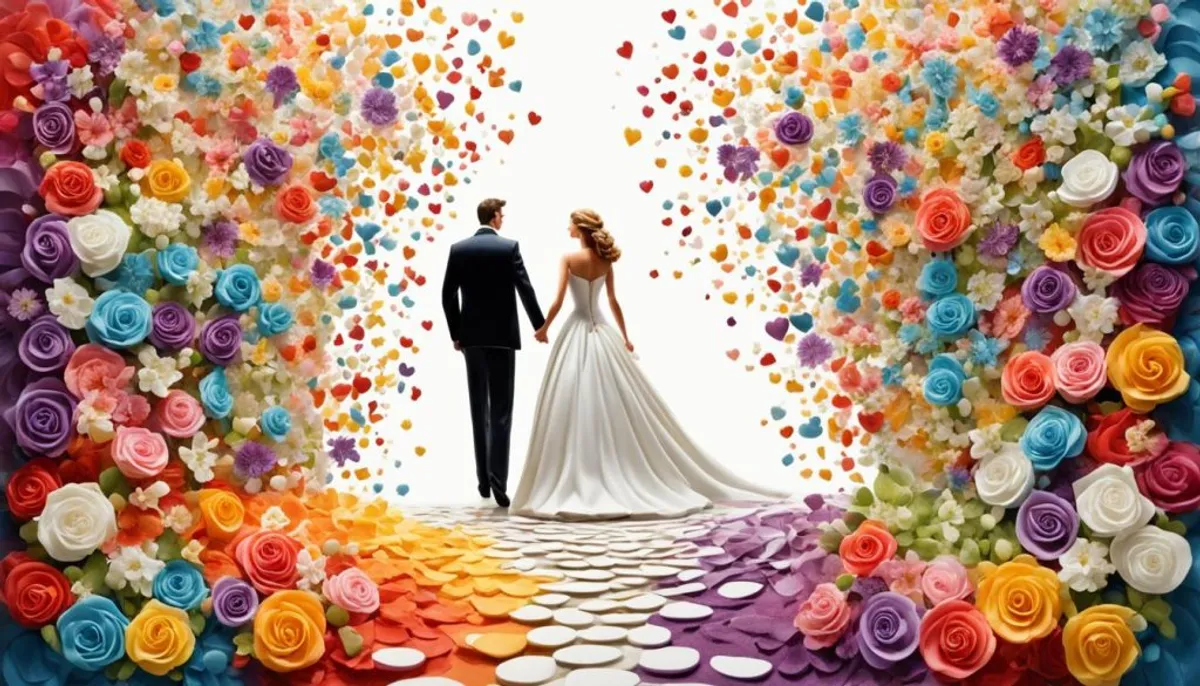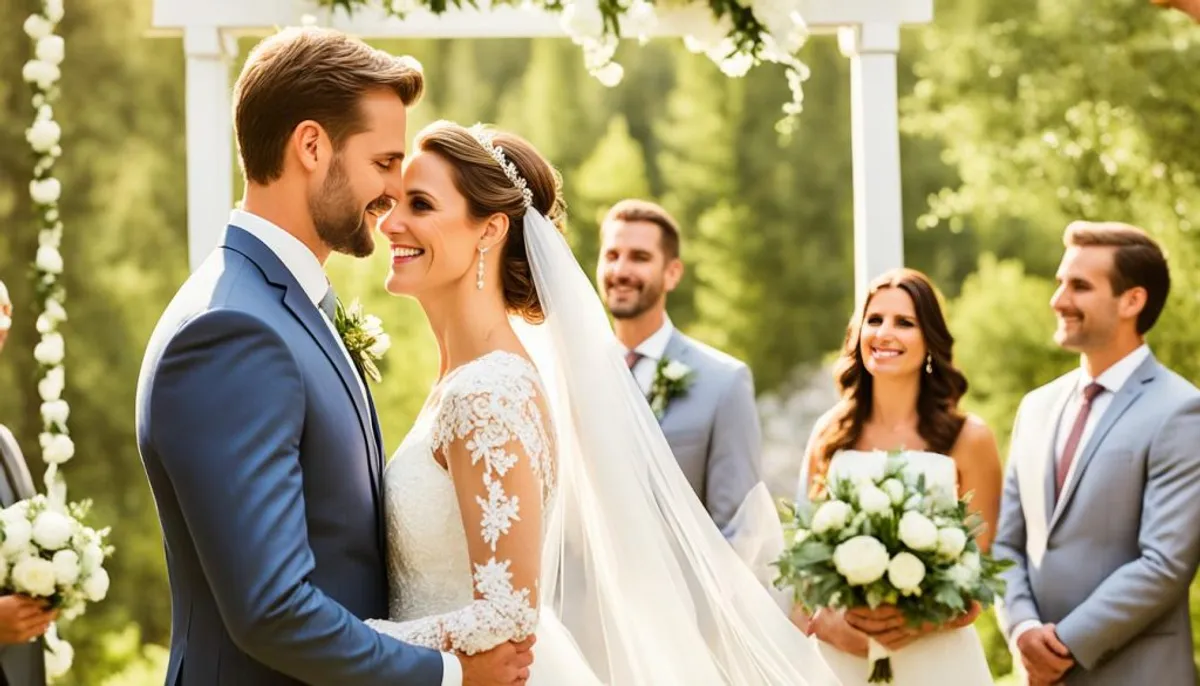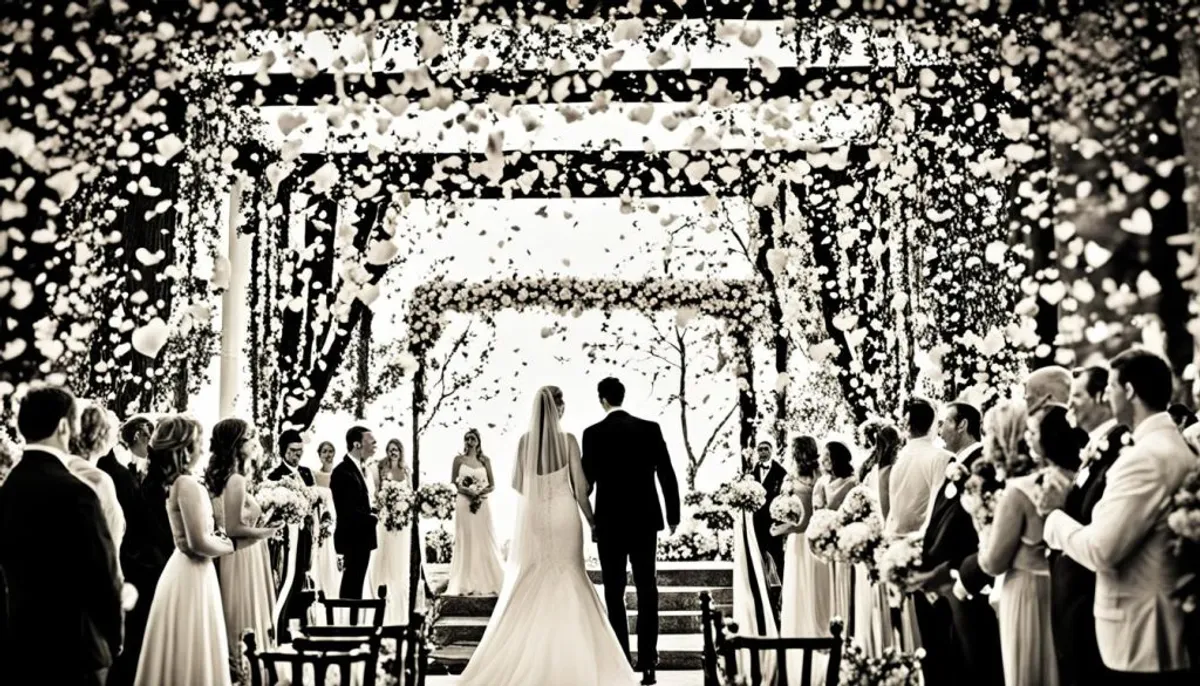Engagements and marriages are big steps for couples in love. They differ in their nature and the commitment they ask for. Engagements are like a trial run, helping couples get to know each other better before making a big promise.
Marriage is a legal agreement between two people. It shows a deeper commitment and comes with legal rights and duties.
Engagements help couples plan for their big day. Marriage is the big step that makes their bond legal and opens doors to a life together. It’s important to know this difference as couples face the challenges of their relationship.

Whether you’re celebrating an engagement or starting a life together, it’s key to see what each step means. Knowing the differences between engagement and marriage helps couples make better choices. It also helps them understand their relationship better.
Understanding the Distinction Between Engagement and Marriage
Engagement and marriage are two important steps in a couple’s journey. Each has its own meaning and legal effects. Engagement is when a couple promises to get married. Marriage makes that promise official with a legal bond.
The Significance of Engagement
Engagement is a time when a couple tells the world they plan to marry. They often give each other engagement rings, showing their promise to be together. This is when they start planning their wedding and making big decisions about their future.
Marriage: A Legally Binding Union
When a couple gets married, they become a legal team recognized by society. Marriage means a deeper promise and responsibility. It gives the couple certain rights and duties. Saying their vows at a wedding ceremony makes them officially married.
Knowing the difference between engagement and marriage is key. It helps couples understand the legal and commitment levels of each step. This makes their journey to being together smoother and more informed. Many couples also seek a dua for marriage guidance to help them navigate this important phase in their lives.
The Importance of Wedding Ceremonies
At the heart of any wedding day is the wedding ceremony. This is where the couple says their vows and becomes married by law and their community. It’s a mix of seriousness and happiness, celebrating a big step in the couple’s life together.
The Solemn Exchange of Vows
The wedding ceremony has many important parts. These include a bridal procession, readings, the vows exchange, rituals, music, and the official marriage announcement. Here, the couple promises their lives to each other in front of their closest family and friends. Many couples choose to celebrate during the islamic wedding month, which adds a special significance to their union.
This ceremony is more than just a formality. It’s a deep commitment that builds the base for their future together.
- The vows exchange is a moving moment. The couple shares their love and promise to each other.
- Traditional wedding rituals and traditions are often part of the ceremony. They add cultural meaning and personal touches.
- The ceremony is a special rite of passage. It honors the couple’s choice to join their lives in marriage.
The wedding ceremony is the core of the wedding day. It’s a time-honored tradition that means a lot to the couple and their loved ones. It’s a moment of deep commitment and the beginning of a new chapter in their lives together.

Celebrating Love: The Wedding Reception
After the wedding ceremony, the real celebration starts – the wedding reception! This event is all about eating, drinking, dancing, laughing, and enjoying the first hours as a married couple. It’s bigger, lighter, and more festive than the ceremony.
The wedding reception doesn’t follow a strict plan. It flows smoothly with tasty dinner choices, touching toasts, fun dancing, games, and socializing. The couple hosts this party as a big thank you to their guests. It’s a time for everyone to relax, have a good time, and celebrate the newlyweds.
A Joyous Gathering of Family and Friends
The wedding reception brings together the couple’s family and friends to enjoy their happiness. Guests mingle, share stories, and make memories as they celebrate the couple’s new life together. From the first dance to the last toast, it’s filled with laughter, music, and joy.
- Delectable dinner options
- Heartfelt toasts to the newlyweds
- Lively dancing to energize the party
- Entertaining games and activities
- Open socializing to connect with loved ones
The wedding reception is a special celebration for the newlyweds and their guests. It’s a time to enjoy the moment, make lasting memories, and wish the couple a future full of love and happiness.
Difference Wedding Marriage: Key Contrasts
The wedding ceremony is a serious event that makes the couple’s union official. It’s filled with traditional rituals and vows that show their deep commitment. Afterward, the reception is a time for fun, where everyone can celebrate the new marriage.
At the reception, family and friends can relax, eat, dance, and congratulate the couple. It’s a joyful way to celebrate the start of their life together.
Purpose and Commitment Levels
The wedding ceremony is more than just a party. It’s a formal way to make the couple’s union official, with legal steps and a strong commitment. The purpose of marriage is to create a lasting partnership that’s legally recognized.
The purpose of engagement is different. It’s about planning the wedding and showing the world you’re ready to marry. It doesn’t have the same legal weight as marriage.
Structure and Timelines
The wedding ceremony has a set order of events, like the processional and the ring exchange. It’s a meaningful sequence that follows tradition. Receptions, however, are more flexible and full of surprises.
Special moments like the first dance and cake cutting happen during the party. Ceremonies usually last less than an hour to keep things solemn. Receptions can go on for hours, filled with fun and celebration.
Guest Lists and Venues
The ceremony is a smaller, more intimate event. But the reception is bigger, inviting everyone to join in the fun. Ceremonies often take place in places that hold spiritual meaning, like churches or outdoor spots.
Receptions are held in venues that are perfect for eating, drinking, and dancing. These places can be banquet halls, ballrooms, or wedding venues. The choice of venue sets the tone for the event.

Cultural Traditions and Ceremonies
Thai Engagement and Wedding Ceremonies
The Thai culture is full of traditional ceremonies that celebrate love and commitment. The “Phitee Mun” is a special engagement ritual. It’s very important to the couple and their families.
The engagement starts with the groom’s family giving a dowry to the bride’s family. This shows the groom’s commitment and the family’s welcome of the union. Then, a blessing ceremony happens, where friends tie a string on the couple’s hands. This means they accept the engagement and wish the couple a happy future.
Nowadays, Thai engagements and weddings often happen together in one place. The engagement is in the morning with close family and friends. Then, the big wedding is in the afternoon, with more guests celebrating the couple’s love.
These Thai cultural traditions show the importance of family and community. They also highlight the couple’s promise to each other and their future together.
Conclusion
Weddings and marriages have different purposes and levels of commitment. Engagements are a step to deepen understanding and plan for the marriage. Marriage is a legal union that shows a deeper commitment with legal rights and duties.
The wedding ceremony makes the couple’s union official. The reception is a time to celebrate with loved ones. Knowing these differences helps couples plan each event to fit their vision and values.
As couples start this journey, understanding the differences between weddings and marriages helps them make better decisions. It lets them plan and enjoy the beauty of their marriage journey.
RelatedRelated articles



